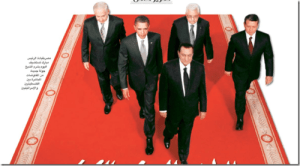The Rise of Egyptian Satiric Literature: Good, Bad, Indifferent?

The rise in Egypt’s comic-satirical literature has been getting press, both locally (The fading red lines in Egypt’s political literature, Al Masry Al Youm) and abroad (Oppression, wealth gaps spurs satire in Egypt, Reuters).
And while crackdowns have been afflicting other information outlets, such as broadcast text messaging, live TV, and some satellite stations—with a strong feeling that these crackdowns will continue in the run-up to elections—books have, on the other hand, seen a bit more breathing room.
While it was once taboo to talk trash about the president, “criticizing the president and his son is no longer a red line,” Gamal Eid, director of the Arab Network for Human Rights Information, told Al Masry Al Youm.
Most commentators don’t expect that satire will bring a revolution. For the most part, Egyptian satire focuses less on being politically motivating and more on being funny. But critic Rabie Moftah told Reuters’ Shaimaa Fayed that the rise of satiric works does mean something:
In my view as a critic, I see that in the coming period, satirical literature and satirical writings will spread. Why? Because contradictions and gaps are increasing.
Satire is, of course, not a new genre in Egypt. Sure, there were Mahmoud Taymur and Mahmoud El Saadany, but before that, there were the satirists of the Pharaohs’ times. (Really.) According to successful satirist Bilal Fadl, this sort of humor has become an integral part of the Egyptian character:
You are dealing with a nation where powerful, sharp and sometimes scathing satire is a way of life.
Not everyone, of course, is a fan. Ahmed Naje, journalist, blogger, and author of the novel Rogers, told Reuters that: “Most of the satirical writing is not literature, but rather collections of one-liners.”
Recent satirical offerings include: Haitham H. Dabbour’s Article 212, a hypothetical continuation of Egypt’s constitution, from Dar el Shorouk. Reviewed here by Amany Aly Shawky at Al Masry Al Youm.
Ahmed al-Esseili‘s Ketab Maloush Esm (A Book with No Name)
Omar Taher, Shaklaha Bazet, Captain Misr, Paving Egypt, others.
Bilal Fadl, A Chagrined Laugh, one of the best-sellers at last year’s Cairo Book Fair. Read Fadl’s blog, which hasn’t been updated in a while.
Ahmed Ragab, who writes Nos Kelma (Half a Word) for Al-Akhbar. (Ragab receiving a merit award.)
Some commentators call Ghada Abdel Aal’s Ayza Atgowaz (I Want to Get Married) a satiric novel. I would probably class it as comic, except that I don’t have any other women on this list.

Mahmoud Darwish, Benny Morris et alia : invisiblearabs
October 14, 2010 @ 12:34 pm
[…] sullo humour, a volte sul sarcasmo, è in ascesa, scrive M. Lynx Qualey nel suo sempre puntuale arablit, blog sulla letteratura araba che consiglio caldamente. Sta per essere pubblicato in inglese un […]